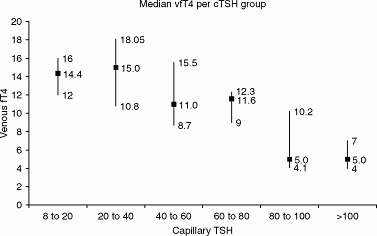BSPED2012 Oral Communications Oral Communications 2 (10 abstracts)
When is it justifiable to await venous thyroid function tests before starting thyroxine treatment in infants referred with capillary TSH elevation?
Tzveta Pokrovska , Jeremy Jones , Guftar Shaikh & Malcolm Donaldson
Royal Hospital for Sick Children, Glasgow, UK.
Background: In Scotland median age at notification with elevated capillary (c) TSH (>25 initially or >8 μ/l on repeat testing) is 10 (range 3–35) days. If cTSH elevation is >100 μ/l decompensated hypothyroidism (moderate: free (f) T4 5 −<10, severe: <5 pmol/l) is likely and thyroxine treatment should start without delay. If TSH elevation is mild the clinician may prefer to wait for venous (v) fT4 result and observe the infant’s progress rather than commit the child and family to 2–3 years of thyroxine.
Aim: To determine the cTSH value below which the probability of vfT4 <5 pmol/l is <5%.
Method: We examined capillary TSH vs venous fT4 values in all newborn infants referred in Scotland since 2002 (when the assay and cut-off TSH values were last changed).
Results: Of 275 infants referred, 254 were suitable for study, comprising definite/ probable hypothyroidism (169), transient TSH elevation (42) and status uncertain (41). The correlation between cTSH and vfT4 was 0.6. Of 94 infants with cTSH <40 μ/l, fT4 was 5.0 −<10 in 11 and <5 in 4.
Conclusion: Our data suggest that when cTSH is <40 μ/l the risk of severely decompensated hypothyroidism is sufficiently low to justify waiting for vfT4 before starting treatment provided that the infant is not displaying hypothyroid symptoms.





